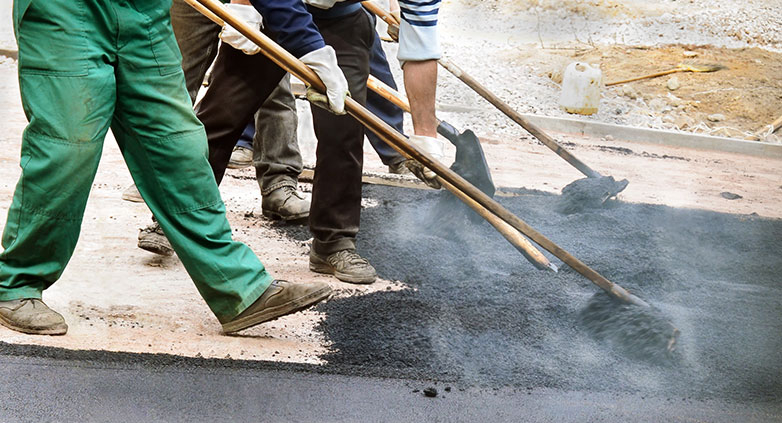Types of Asphalt – 9 Varieties and When to Use Them
When it comes to paving options, the choice of materials plays a crucial role in the longevity and aesthetics of your surfaces. Among the various options available, understanding the nuances of different types of asphalt becomes essential for making an informed decision that aligns with your specific needs.
Types of asphalt encompass a range of variations, each serving specific purposes. From the rough and supportive nature of course graded asphalt, ideal for surface lifts on driveways and roadways, to the environmentally friendly qualities of porous asphalt that allows water drainage, the diverse options cater to various requirements. Explore the cost-effective and weather-resistant characteristics of hot mix asphalt, or consider the softer and water-repelling nature of cold mix asphalt, perfect for temporary repairs. Delve into the versatile UPM designed to work under any weather condition, or the top layer asphalt that offers both aesthetics and durability. Each type, including milled asphalt, warm mix asphalt, and MC Cold Mix, brings unique attributes to the table, ensuring optimal results for your specific pavement projects.
Delve into the world of asphalt to discover the ideal solution for your paving needs. Whether you prioritize cost-effectiveness, environmental considerations, or specific performance attributes, the following insights into different types of asphalt will guide you towards making the most informed decision for your surfaces.
9 types of asphalt to evaluate
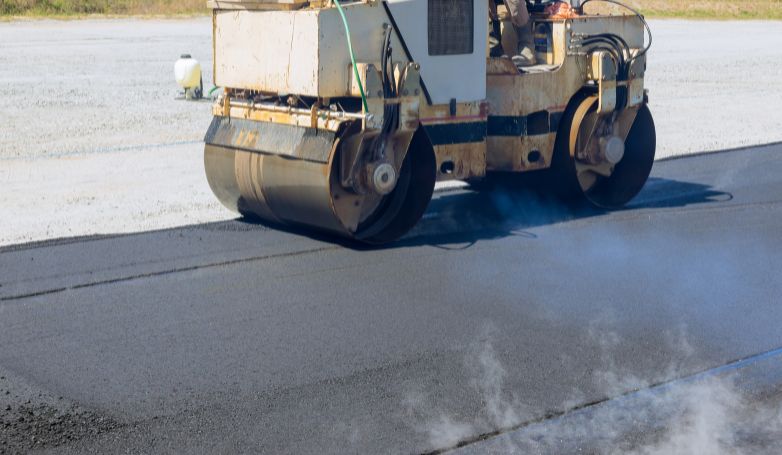
Various asphalt types offer numerous variations that can meet particular needs. Nevertheless, the list includes the following different asphalt types, but is not limited to them..
- Course Graded Asphalt
- Porous Asphalt
- Milled Asphalt
- Hot Mix Asphalt
- Warm Mix Asphalt
- Cold Mix Asphalt
- UPM
- MC Cold Mix
- Top Layer Asphalt
Embark on a journey through the diverse universe of asphalt, where each type boasts its own unique performance attributes. From enhancing braking efficiency to ensuring surface durability and minimizing roadway noise, the world of asphalt varieties is a fascinating exploration waiting to unfold. Join us as we delve into the distinct characteristics that define each type, offering insights that will shape your perspective on the optimal choice for your paving needs.
1. Course Graded Asphalt
Course Graded Asphalt, often referred to as “binder mix,” stands as a sturdy foundation for driveways and roadways. Its rough texture enhances skid resistance, providing support for surface lifts. While it excels in reducing hydroplaning and improving resistance to skidding, there’s a delicate balance required, as its high porosity may compromise bonding between fine aggregates, affecting overall durability. Ideal for specific applications, its nuanced composition demands consideration for optimal performance in paving projects. Continue reading to discover other types of asphalt.
2. Porous Asphalt
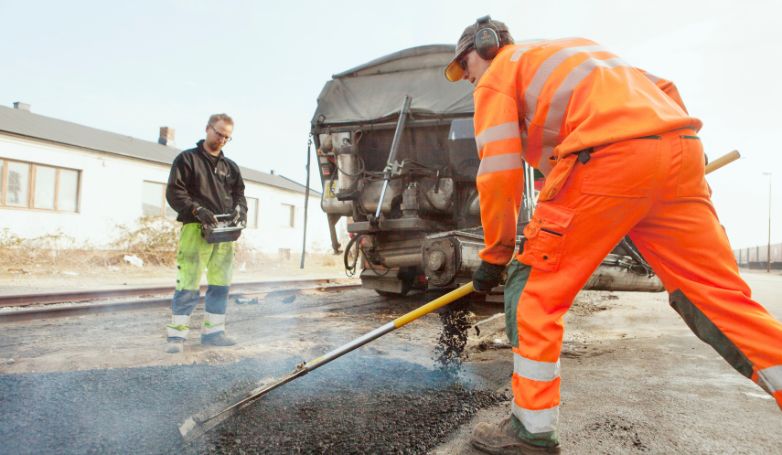
Porous Asphalt, distinguished by its visible perforations, serves as a groundbreaking solution for effective water drainage and stormwater management. Designed with environmental considerations in mind, it allows water to flow through its surface, reducing runoff. While excelling in eco-friendly applications and enhancing skid resistance, it is often tailored for use in areas with lower traffic, as heavily traversed commercial spaces may cause the porous structure to wear more quickly.
3. Milled Asphalt
Milled Asphalt, a recycled by-product of rejuvenated pavement, offers a sustainable and cost-effective alternative in paving. Created by grinding the top layer of old asphalt into a reusable material, it serves as an environmentally friendly option that reduces the demand for new aggregate. However, its variable quality and a color that may differ from fresh asphalt make it more suitable for applications where visual consistency is not a primary concern, emphasizing functionality and environmental benefits. Delve deeper to reveal further classifications and characteristics among different types of asphalt.
4. Hot Mix Asphalt
Hot Mix Asphalt, renowned for its durability and weather resistance, is a premier choice for high-traffic zones and critical surfaces. Manufactured under elevated temperatures, it provides a flexible and robust pavement solution. With the ability to withstand harsh weather conditions, including wind and flooding, Hot Mix Asphalt stands as a resilient option. Despite its higher cost, its enduring performance and versatility make it a preferred choice for highways and areas experiencing heavy traffic, ensuring long-term reliability.
5. Warm Mix Asphalt
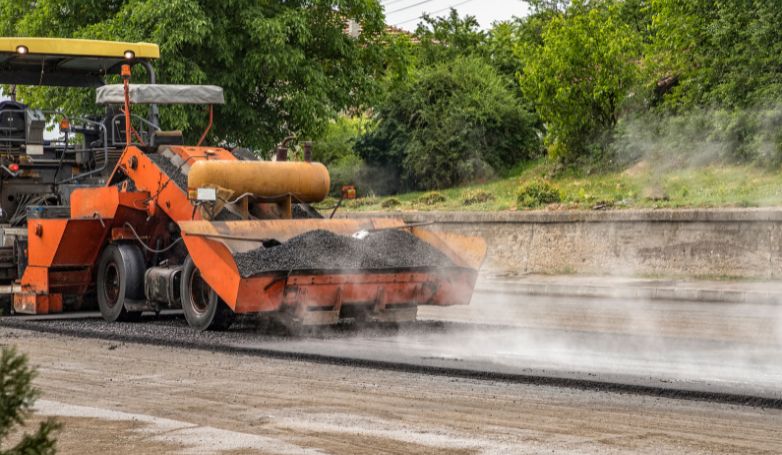
Warm Mix Asphalt, a cutting-edge alternative to traditional hot-mix asphalt, is produced at temperatures 50 to 100 degrees Fahrenheit lower. This innovative approach offers environmental benefits by reducing energy consumption during construction and lowering CO2 emissions. While it tends to be costlier, the advantages include resource savings, improved working conditions, and faster pavement curing times, making it an appealing choice for those seeking sustainable and efficient “green” solutions in asphalt paving projects.
6. Cold Mix Asphalt
Cold Mix Asphalt is a versatile and pliable paving material designed to remain soft and workable at lower temperatures. Ideal for patching potholes and addressing pavement issues in colder climates, it provides an affordable and convenient solution for temporary repairs. While its soft nature limits its lifespan, Cold Mix Asphalt serves as a valuable tool in addressing immediate concerns, making it a pragmatic choice for quick fixes in adverse weather conditions and temporary paving needs.
7. UPM
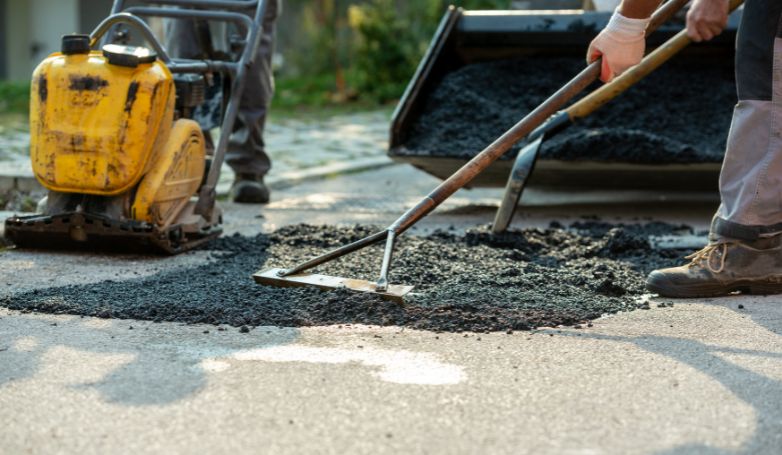
UPM (Unique Paving Material) stands out as a highly versatile asphalt solution, engineered to provide a permanent fix for a variety of pavement issues. Ideal for repairing both dry and wet potholes, UPM ensures a seamless and durable result. Its user-friendly application, cost-effectiveness, and ability to perform well under diverse weather conditions make it a reliable choice for addressing pavement challenges. However, its usage may be more specialized, primarily tailored to repairs rather than high-traffic driveways or extensive new pavement installations. Keep reading to uncover more insights into the diverse world of types of asphalt.
8. MC Cold Mix
MC Cold Mix, a specialized asphalt mixture, is tailored for temporary patching in pavement sections that require a slow-curing solution. Its advantageous higher flashpoint facilitates ease of handling, making it suitable for light-duty traffic areas. Although it may not cure as quickly as traditional mixes, MC Cold Mix stands resilient in small, infrequently used spaces. It can be stockpiled for later use, offering convenience in addressing pavement repairs while requiring minimal cooling of aggregates during the mixing process.
9. Top Layer Asphalt
Top Layer Asphalt, applied at temperatures between 300 to 350 °F, serves as the final aesthetically pleasing surface in paving projects. This asphalt mix, with its smaller stone feature, forms a compact and visually appealing surface when properly compacted. While offering cost efficiency and reducing noise pollution, it tends to require more maintenance than some alternatives. Despite its need for periodic upkeep, Top Layer Asphalt remains a popular choice for projects where both visual appeal and functionality are essential considerations.
Which asphalt type is the best?
While all types of asphalt serve diverse paving needs, the optimal choice depends on the specific requirements of the homeowner. To streamline decision-making, it’s essential to find the asphalt mix that strikes a perfect balance between cost, efficiency, and overall value. For a comprehensive overview of the pros and cons of each asphalt type, refer to the table below.
Here is the translated table with scores assigned to the specified asphalt types across the three parameters:
| Asphalt Type | Durability | Water Resistance | Installation and Maintenance Costs |
|---|---|---|---|
| Course Graded Asphalt | 8 | 8 | 7 |
| Porous Asphalt | 7 | 7 | 6 |
| Milled Asphalt | 6 | 6 | 5 |
| Hot Mix Asphalt | 9 | 9 | 8 |
| Warm Mix Asphalt | 8 | 8 | 7 |
| Cold Mix Asphalt | 5 | 5 | 8 |
| UPM | 7 | 7 | 6 |
| MC Cold Mix | 6 | 6 | 7 |
| Top Layer Asphalt | 8 | 8 | 8 |
FAQs about Types of Asphalt
Navigating the world of asphalt can be complex, with various types catering to diverse project needs. In this FAQ section, we address common queries to shed light on essential aspects. Whether you’re seeking the most cost-effective option, the strongest asphalt for heavy-duty applications, or an eco-friendly choice for sustainable projects, we’ve got you covered. Let’s unravel the nuances of asphalt selection.
What is the most cost-effective asphalt type?
The most cost-effective asphalt type often depends on the specific project requirements and local considerations. Frequent choices in projects, particularly in temporary repairs, often involve Cold Mix Asphalt due to its affordability.However, the overall cost-effectiveness may vary based on factors such as installation expenses and long-term maintenance needs.
What is the strongest asphalt?
The strength of asphalt is often attributed to high-performance mixes like Hot Mix Asphalt (HMA) used in heavy-duty applications such as highways and high-traffic roads. These mixes are designed to withstand substantial loads, environmental stresses, and temperature variations, making them among the strongest and most durable asphalt types available. The specific mix design may vary based on project requirements and regional standards.
What asphalt is recommended for environmentally conscious projects?
Environmentally conscious projects often recommend Warm Mix Asphalt. It operates at lower temperatures during production, reducing energy consumption and greenhouse gas emissions. Its eco-friendly attributes make it a preferred choice for sustainability-focused paving initiatives.
Conclusion
A diverse array of asphalt types stands ready to address the unique challenges faced by your business or home surfaces. Delving into the nuances of each variant is key to selecting the most fitting solution for your specific requirements.
However, the complexity of asphalt dynamics underscores the importance of seeking guidance from seasoned professionals in the field. Enlisting the expertise of a professional asphalt paving contractor ensures not only informed decision-making but also comprehensive insights into life cycle costs, optimal value, and unwavering quality, ultimately guaranteeing the best outcome for your project.

